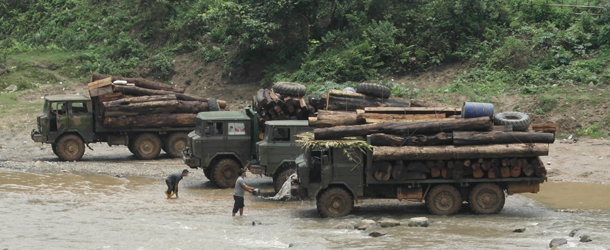RANGOON — Between 2000 and 2013, Burma’s rich forests were decimated through authorized logging as well as a massive illegal timber trade that saw 22.8 million cubic meters of wood with an estimated total value of US$8 billion leave the country, a new report says.
Of this enormous quantity of exported timber, 48 percent was felled illegally, without any government permission, while $5.7 billion worth of logs—or 72 percent of the trade—was smuggled across the border through illicit export deals, according to the Environmental Investigation Agency (EIA).
A Forestry Department official and a Burmese timber merchant rejected the report on Wednesday and insisted that the regulation of Burma’s forestry sector is improving.
EIA, a UK-based environmental watchdog, said its findings, which were released in a briefing paper on Tuesday, indicate “rampant criminality and corruption” in Burma’s timber sector and raise questions over who has benefitted from the $5.7 billion in timber exports missing from the government’s books.
EIA said it had calculated the figures after comparing timber import data from India, China, Thailand and Bangladesh, collected from international trade registers, with Burma government timber trade figures for the period 2000-2013, which were recently published in local media.
The research results “demonstrate fundamental governance failures in Myanmar’s timber sector,” EIA said. “Wide-ranging reform is required to sustain forest resources and enable access to the increasing number of high-value markets sensitive to legality issues, including the EU, US, Australia and others.”
Poor Regulations, Insurgency and Timber Smuggling
International environmental researchers have long raised concerns over the legality and environmental sustainability of Burma’s timber extraction policies. During past decades of military rule, deforestation was fueled by mismanagement and corruption, while crony businessmen were allowed to plunder the forests on a massive scale. Long-running ethnic conflicts also caused insurgents and illegal traders to raid the forests.
The state-owned Myanmar Timber Enterprise (MTE) is supposed to regulate the timber trade and license any wood export. Since the mid-2000s, timber can only be exported via Rangoon Port.
EIA said it found that 72 percent of all exported timber left without MTE approval, adding, “This [data] reveals chronic levels of unlicensed logging and timber smuggling throughout Myanmar.”
Government officials have said that the Kachin Independence Army (KIA) and other groups in northern Burma are colluding with Chinese traders to raid the country’s northern forests. The ongoing insurgency there has left the area beyond government control and vulnerable to large-scale illegal logging, which sees huge quantities of timber flow across the border into China unregulated and untaxed.
EIA noted, however, that illegal logging and illicit cross-border trade is “a problem which is by no means confined to ethnic areas, as the government claims.”
“When excluding the [overland China] trade, which the government deems illegal, unauthorized exports during the period [2000-2013] amounted to US$2.8 billion,” the group said.
EIA said its findings represent a gross government failure to stop a huge loss of valuable natural resources, and it estimated that if all missing timber export, totaling 16.4 million cubic meters, “was loaded into freight containers laid end to end, it would stretch 2.3 times the length of the Irrawaddy River.”
The Ministry of Environment’s Forest Department deputy director general Nyi Nyi Kyaw dismissed the findings of the EIA report on Wednesday. “The government always carries out official, legal timber trade, we have records. The Forest Department, the Customs Department and the Ministry of Commerce, we record all trade together,” he said.
Nyi Nyi Kyaw said the insurgency in northern Burma was the main driver of the illegal timber trade, adding that the government was in the process of requesting China’s help in stemming the illicit flow of logs. “We are trying to find a solution to solve this problem,” he told The Irrawaddy. “We are trying to address this problem through diplomacy with the Chinese government, high-level [officials] are discussing this.”
In other parts of Burma, he insisted, the situation was much better and illegal logging was being brought under control with the help of a new Forest Police Department set up by the Home Affairs Ministry in recent months. “Now we are catching illegal loggers, recently the illegal timber trade has been on the rise. From December 2013 until now, we caught more than 10,000 illegal loggers,” he claimed.
President Thein Sein’s quasi-civilian government, which took over in 2011, has indicated that it is willing to reform the extraction, revenue-raising and contract-awarding policies for Burma’s rich natural resources.
In an effort to reduce deforestation and regulate the timber industry, the government decided to ban the export of raw logs per April 1, after which only sawn wood is allowed to be exported. Burma’s government has also expressed interest in reforming its timber supply chain with the help of the European Union.
“The government is pushing the businessmen to move to processing of wood, in this way they can earn more money. We also invite international companies to invest in this timber-processing sector,” Nyi Nyi Kyaw said.
Ba Ba Chor, head of the Myanmar Timber Merchants Association, said the EIA report had applied rigorous international timber trade standards to Burma’s outdated timber policy. “Their definition of legal timber, for us it’s not easy to attain,” he said. “They are watching the situation from a very negative point of view, they do not recognize that we are going to reform,” he told The Irrawaddy.
Ba Ba Chor also defended his association’s production methods, saying, “From forest to factory production, we have a good system. We have some bad cases, but they say we are doing things 100 percent wrong—I don’t agree with that.”

















